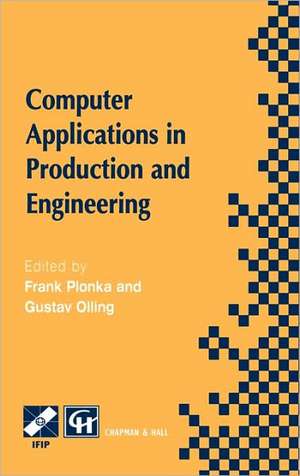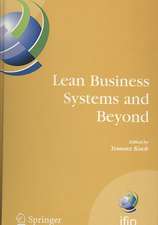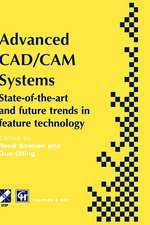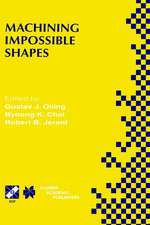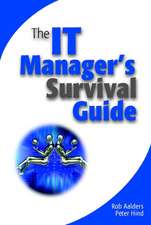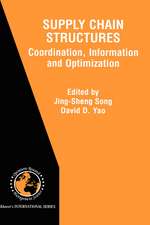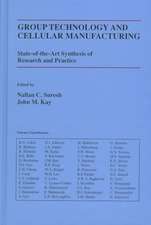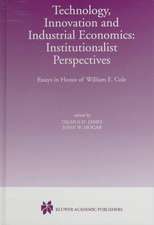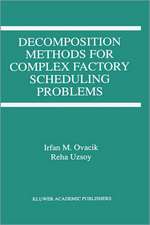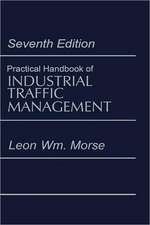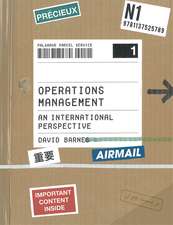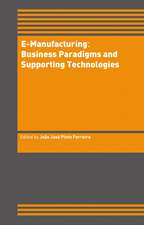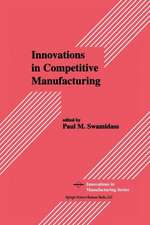Computer Applications in Production and Engineering: IFIP TC5 International Conference on Computer Applications in Production and Engineering (CAPE ’97) 5–7 November 1997, Detroit, Michigan, USA: IFIP Advances in Information and Communication Technology
Editat de Frank Plonka, Gustav J. Ollingen Limba Engleză Hardback – 31 oct 1997
| Toate formatele și edițiile | Preț | Express |
|---|---|---|
| Paperback (1) | 2109.71 lei 6-8 săpt. | |
| Springer Us – 15 mai 2013 | 2109.71 lei 6-8 săpt. | |
| Hardback (1) | 2116.19 lei 6-8 săpt. | |
| Springer Us – 31 oct 1997 | 2116.19 lei 6-8 săpt. |
Din seria IFIP Advances in Information and Communication Technology
- 20%
 Preț: 170.51 lei
Preț: 170.51 lei - 20%
 Preț: 615.75 lei
Preț: 615.75 lei - 20%
 Preț: 340.32 lei
Preț: 340.32 lei -
 Preț: 397.38 lei
Preț: 397.38 lei - 20%
 Preț: 336.02 lei
Preț: 336.02 lei - 20%
 Preț: 340.98 lei
Preț: 340.98 lei - 20%
 Preț: 503.43 lei
Preț: 503.43 lei - 17%
 Preț: 523.41 lei
Preț: 523.41 lei - 20%
 Preț: 502.07 lei
Preț: 502.07 lei - 17%
 Preț: 488.99 lei
Preț: 488.99 lei - 20%
 Preț: 501.05 lei
Preț: 501.05 lei - 20%
 Preț: 403.20 lei
Preț: 403.20 lei - 20%
 Preț: 2194.47 lei
Preț: 2194.47 lei - 15%
 Preț: 708.83 lei
Preț: 708.83 lei - 20%
 Preț: 1162.14 lei
Preț: 1162.14 lei - 20%
 Preț: 1288.25 lei
Preț: 1288.25 lei - 18%
 Preț: 1227.21 lei
Preț: 1227.21 lei - 20%
 Preț: 1282.00 lei
Preț: 1282.00 lei - 18%
 Preț: 1224.18 lei
Preț: 1224.18 lei - 18%
 Preț: 953.03 lei
Preț: 953.03 lei - 18%
 Preț: 953.20 lei
Preț: 953.20 lei - 18%
 Preț: 944.99 lei
Preț: 944.99 lei - 18%
 Preț: 948.29 lei
Preț: 948.29 lei - 15%
 Preț: 645.47 lei
Preț: 645.47 lei - 18%
 Preț: 960.13 lei
Preț: 960.13 lei - 20%
 Preț: 1288.11 lei
Preț: 1288.11 lei - 15%
 Preț: 645.79 lei
Preț: 645.79 lei - 20%
 Preț: 1271.10 lei
Preț: 1271.10 lei - 20%
 Preț: 1922.99 lei
Preț: 1922.99 lei - 20%
 Preț: 1285.97 lei
Preț: 1285.97 lei - 18%
 Preț: 956.69 lei
Preț: 956.69 lei - 18%
 Preț: 946.72 lei
Preț: 946.72 lei - 18%
 Preț: 1224.36 lei
Preț: 1224.36 lei - 20%
 Preț: 1277.89 lei
Preț: 1277.89 lei - 18%
 Preț: 953.03 lei
Preț: 953.03 lei - 18%
 Preț: 947.98 lei
Preț: 947.98 lei - 20%
 Preț: 1292.54 lei
Preț: 1292.54 lei - 18%
 Preț: 956.18 lei
Preț: 956.18 lei - 20%
 Preț: 645.79 lei
Preț: 645.79 lei - 20%
 Preț: 1284.47 lei
Preț: 1284.47 lei - 18%
 Preț: 1235.25 lei
Preț: 1235.25 lei - 20%
 Preț: 998.70 lei
Preț: 998.70 lei - 18%
 Preț: 949.23 lei
Preț: 949.23 lei - 20%
 Preț: 1283.81 lei
Preț: 1283.81 lei - 20%
 Preț: 995.89 lei
Preț: 995.89 lei - 18%
 Preț: 1231.01 lei
Preț: 1231.01 lei - 20%
 Preț: 993.09 lei
Preț: 993.09 lei - 20%
 Preț: 1288.94 lei
Preț: 1288.94 lei - 20%
 Preț: 987.17 lei
Preț: 987.17 lei
Preț: 2116.19 lei
Preț vechi: 2580.72 lei
-18% Nou
Puncte Express: 3174
Preț estimativ în valută:
404.98€ • 439.75$ • 340.18£
404.98€ • 439.75$ • 340.18£
Carte tipărită la comandă
Livrare economică 22 aprilie-06 mai
Preluare comenzi: 021 569.72.76
Specificații
ISBN-13: 9780412821103
ISBN-10: 0412821109
Pagini: 740
Ilustrații: XII, 740 p. 166 illus.
Dimensiuni: 155 x 235 x 40 mm
Greutate: 1.23 kg
Ediția:1997
Editura: Springer Us
Colecția Springer
Seria IFIP Advances in Information and Communication Technology
Locul publicării:New York, NY, United States
ISBN-10: 0412821109
Pagini: 740
Ilustrații: XII, 740 p. 166 illus.
Dimensiuni: 155 x 235 x 40 mm
Greutate: 1.23 kg
Ediția:1997
Editura: Springer Us
Colecția Springer
Seria IFIP Advances in Information and Communication Technology
Locul publicării:New York, NY, United States
Public țintă
ResearchCuprins
1 Towards computer-aided rapid product realization.- 2 Enhancing life-cycle integration through the application of case-based reasoning to quality function deployment.- 3 A case study on CAD/CAM data transfer in CIM environment.- 4 The object-oriented modeling for product data management (PDM).- 5 Definition of numerical models for rapid product development.- 6 Impacts of data mining technology on product design and process planning.- 7 On the implementation of product model interfaces in CIME.- 8 A long-term planning approach for small-medium enterprise networks.- 9 Global supply chain integration.- 10 A platform to support production planning and management in a virtual enterprise.- 11 A Fuzzy approach for the globalization of production activities.- 12 Modeling to support a food industry in the extended enterprise.- 13 Utilizing real-time market demand information in the integration of the supply chain in the food industry.- 14 Multi-axis machining with additional-axis NC system.- 15 The validity of Z-map model for mold and die machining.- 16 Probabilistic approaches for estimating surface roughness in multi-pass horizontal grinding operations.- 17 Simulation study of the process parameters of a new precision grinding method.- 18 A computer model for tool management information system.- 19 A comprehensive modelling methodology for the development of manufacturing enterprise systems.- 20 Using IDEF0 to develop generic business process models.- 21 Process assessment method — an approach for business process development.- 22 Information transfers as a metric for engineering processes.- 23 Consequences of current organizational concepts on management control and design/production processes interactions.- 24 Machining feature generation based on a facility model andmanufacturing knowledge.- 25 Simulation of wires handling for the automation of industrial processes.- 26 Integration of reverse engineering and rapid prototyping with data reduction.- 27 Performance prediction of P/M electrodes in EDM using artificial neural network.- 28 Rapid manufacturing of dinnerware.- 29 Design issues of an integrated software workbench supporting the manufacturing systems design process.- 30 World wide simulation environment (WISE).- 31 A scenario simulation methodology for re-engineering potential assesment.- 32 Group technology: generation and selection of the best multi-criteria alternative.- 33 Reduction of cycle time in manufacturing using simulation.- 34 Experiments with a knowledge-based simulator and scheduler system.- 35 Inverse manufacturing: from products to services.- 36 Advances in measurement systems integration.- 37 Sensor-fusion methodology for reducing product quality variation.- 38 Evaluation of roughness of machined surfaces using vision system by phase shifting method.- 39 A novel method to create intelligent sensors with learning capabilities to improve modern production systems.- 40 Model and simulation based flexible production management system.- 41 Integration of process planning and production management.- 42 An approach for the evaluation of an integrated process and production planning and control system.- 43 Implementation of executive information systems around traditional manufacturing control system packages.- 44 An architecture for aggregating real and virtual models in manufacturing systems.- 45 Concurrent engineering applications in Mexico: two case studies.- 46 Parallel MRP system.- 47 The practical limits for J.I.T.- 48 Network middleware for enterprise enhanced operation.- 49 Improving construction information communications: a development framework.- 50 Multi-agent and manufacturing: a multilevel point of view.- 51 The application of integrated intelligent systems (IIS) to production scheduling.- 52 Simulation of embedded decision processes in manufacturing systems.- 53 An intelligent planning network for manufacturing systems management.- 54 An enterprise integration framework for manufacturing environments.- 55 IMAGIM+ a knowledge-based system for enterprise modelling.- 56 Modeling dynamic management features of virtual enterprises.- 57 An enterprise modeling and integration in Mexican manufacturing and service companies.- 58 VIRSIM: a methodology supported by integrated software for the re-engineering of the factories.- 59 Teaching engineering technology with the world wide web.- 60 Workforce implications for the virtual manufacturing environment.- 61 The relationship between competencies learned in manufacturing engineering programs and competencies represented in the CASA/SME enterprise wheel model.- 62 The european view on global enterprise computer applications in production and engineering.- 63 Information management in demand chain management — a global enterprise view.- 64 A real-time distributed multimedia virtual environment for collaborative engineering.- 65 Collaborative work using our virtual reality network system (VLNET).- Index of contributors.- Keyword index.
